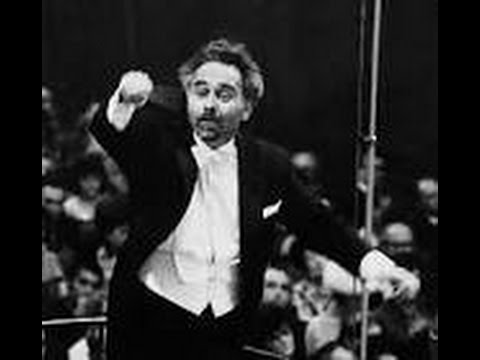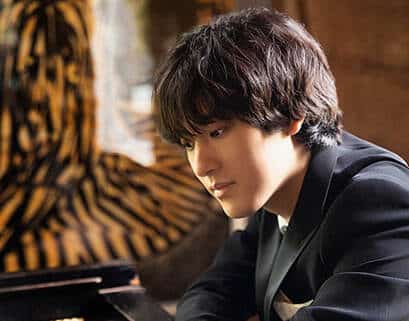The greatest loss to conducting
NewsWe have discussed before the tragic death by drowning of Istvan Kertesz off an Israeli beach in 1973.
He was 43 at the time and about to be named music director of the Cleveland Orchestra.
His legacy is a mountain of Decca recordings, but very few videos.
This film of the 1964 Salzburg Magic Flute turned up this year online.
Watch the overture and you’ll see why Kertesz left such a mighty hole in the history of conducting.
Nikisch-long baton, ultra-precise beat where required, fantasy at all other times.
And take a look at that luxury cast.






As a student at the Mozarteum in the summer of 1963, I saw this amazing production, conducted by Kertesz. The principals of the cast were basically the same except that the speaker was Franz Crass. I had a ticket to every production and we students got into the last dress rehearsal for free. What a summer!
I believe he also had just been named music director of the Ravinia Festival.
Wonderful conductor whom my father loved performing with.
Of course, there are those wonderful early Mozart concertos with Kertesz and Vladimir Ashkenazy
It sounds marvellous.
A question to orchestral players from those of us have never played in an orchestra: is there anything we can judge about a competent conductor by looking at them? Or should we just let our ears judge?
Think about how much an orchestral musician looks at the conductor during a symphony– it’s not that much. Starts, stops, tempo changes, cues, how a particular phrase might go this time. The information an orchestral player needs from the conductor won’t look like much to the most audience members. When I hear non-musicians talk about how great the conductor looked from the audience I wonder what they saw. There are conductors who physically put on a show for the audience. Because you have the discernment to ask this question I am guessing you are sophisticated enough to judge solely on what you hear.
Paradoxically, the best thing to do is focus on the quality of the playing. Although some will say that a fine orchestra can make a mediocre conductor seem like a good one, I tend to disagree; in such cases, a sort of routine professionalism in the music-making is the result.
On the other hand, if the playing is truly compelling, you can usually conclude that the conductor is functioning at a high level, because in the final analysis, the conductor’s job is simply to find a way to bring out the best in the players.
The ways in which this can be accomplished vary widely; anything from true musical genius to a pleasant temperament to sheer political influence can be the principal catalyst. And each conductor brings their own combination of qualities, strengths and weaknesses.
Hmmm… What I’m hearing is that the orchestra isn’t sure when to come in and isn’t sure where the beat is after they do.
Worked with Kertesz once during my early years as an assistant manager with the Minnesota Orchestra. He was a great conductor and fine person. His young death was a great loss to the classical music World. Thank goodness for the recordings.
Agreed, David. In 1971, Kertesz conducted Dvorak’s Seventh Symphony. Unforgettable.
Roberta Peters is absolutely phenomenal here.
Fabulous precision to his beat. All intentions broadcast in time. Funny seeing an all-male orchestra, too.
His 1960s recordings of the complete Dvorak symphonies with the Czech Philharmonic is a landmark in recording history.
LSO not the Czechs but you’re right about how good a cycle it is. There are other good ones too by Neumann and Kubelik for example
Also Rowicki – also LSO, at around the same time as Kertesz‘s, and to my mind even better.
Correction: I meant the London Symphony, of course.
One small correction he was the choice of the musicians of the Cleveland Orchestra (98-2) but the board wanted to take absolute control, after 24 years of playing a subservient role to GS, and insisted on engaging Maazel. Regrettably, in more ways than one, the rest is history.
Don’t foget the loss of Guido Cantelli. A greater conductor.
And Thomas Schippers
I went to hear Cantelli at The Royal Festival Hall in London, I was so lucky. Was it Verdi’s Requiem?
Yes it was, it was his last concert in London.
July 6th, with Elisabeth Schwarzkopf, Ebe Stignani, Ferruccio Tagliavini and Giuseppe Modesti. A concert in Heaven.
A few veterans in the VPO.
A more interesting question: why is it that a relatively small country like Hungary has had so many fantastic conductors (Istvan Kertesz, George Szell, George Solti, Eugene Ormandy, Iván Fischer and many, many more)?
In the case of Solti, Kertesz, Reiner, Fischer and others the answer is the Liszt Academy and the staff which included Leo Weiner, Bartok, and Kodaly. Szell although born in Hungary moved when he was very young and was trained in Vienna.
Thanks Amos, but I think that explanation is not wholly satisfactory as many fine orchestras and cities have excellent academies attached to them. I attribute it to Hungarian’s thirst for classical music at the highest level and by so many fine violinists coming from there.
It has a lot to do with the “system” and the availability of role models. If you organise music education in such a way as to make young people think music is important and is as good a career choice as anything else, you’ve got a head start already. Look at how Estonia promotes music in its schools, values all contemporary composers and provides tuition, training and job opportunities for young musicians. Look at Finland and the staggering number of very successful conductors that equally small country (in terms of population) has produced. The system there too as well as preceding role models give impetus to every new intake of conducting students. It can be done, given the will and a certain amount of financial support. Sadly, for very many countries now music comes way down the list of priorities. And they are the losers.
And Ferenc Fricsay
He was not “about to be named music director of the Cleveland Orchestra.” as Maazel had been named music director the year before!
That’s not what happened in Cleveland.
We have an encyclopedia from Kertesz in comparison to what we have from Ferrara and Argento.
I thought that the Cleveland Orchestra board turned him down, despite that fact that the musicians voted overwhelmingly for him.
For once, I agree with every word you say Norman. Even today, a tragic loss to conducting.
Mmm different orchestra lay out, woodwinds at the right. Any idea why?
Standard Opera/Ballet Pit configuration for many many years.
These days it’s set-up as on Stage with a Symphony, Winds in the Middle
this is still the standard Vienna State Opera seating for repertoire up to and including Rossini, plus small later stuff such as Ariadne auf Naxos. ..Carefully thought out down to the reversal of clarinets and bassoons, so the bassoons aren’t hard up against the wall and disadvantaged in terms of projection into the auditorium.
An outstanding conductor who left many excellent recordings. There was a rumor that he was fatally ill and swam out not meaning to return.
Check out his recording of Don Pasquale. Best Donizetti recording ever (or at least a close contender).
And besides the super brilliant Guido Cantelli, don’t forget Ataúlfo Argenta (1913-58) either. He was about to record the Brahms symphonies with the Vienna Phil for Decca when he died of carbon monoxide inhalation in his car.
Unquestionaly a great, tragic loss. The greatest? How on earth can we compare Kertesz, Cantelli and Fricsay? Their recordings are testaments of three conductors of the absolute highest calibre.
I was at Cantelli’s last concert. It was July 6th 1956 at the Festival Hall with Verdi’s Requiem with Schwarzkopf, Stignani, Tagliavini and Modesti. 65 years ago and the greatest concert in my life.
Everyone has their own opinion, but for me, the loss of Guide Cantelli registers even higher.
It was Guido, Herr Doktor, and every loss means a gain somewhere else. Both Cantelli and Leonard Bernstein were being considered by the NY Philharmonic as their conductor.
Comparisons between the artistry of Cantelli and Kertesz aside, you may have a point inasmuch as Cantelli died almost a decade younger (36/43), so he had fewer productive years and less time to mature artistically. Cantelli died almost two decades before Kertesz, and thus left a smaller recorded legacy at an inferior sound quality.
And for me it would be Ferenc Friscay — IF I were inclined to think in terms of the GREATEST of anything. As the notorious David Hurwitz also knows all too well, incessantly declaring this, that or the other the so-called greatest is fodder for incessant and pointless dispute and keeps the punters coming back.
Richard Morrison who wrote the LSO history has alluded to Kertesz being secreted out of the US after an incident with a minor. Has this ever been verified?
This video – the whole thing – is so utterly fantastic.
Don’t overlook lovely lovely 25-year-old Lucia Popp in the role of the highest of the three child-spirits. I could watch her all day. She was just two years into her career here.
My only regret about it is that Fritz Wunderlich is absent. He was still alive and doing his thing in 1964. Waldemar Kmentt isn’t bad, but he’s not in Wunderlich’s class.
Who is?
Interestingly around the same time Lucia Popp sang the Queen in the Klemperer EMI recording.
https://www.youtube.com/watch?v=Euwl5X04p58